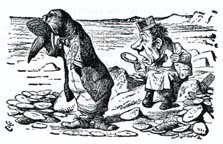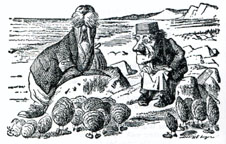Throughout Alice in Wonderland and Through the Looking Glass, Alice expresses her opinions very decidedly for one so young. She regularly attempts to rehearse her lessons, only to botch them herself or to confront an adult who corrects her. She constantly tries to makes sense of whatever world in which she finds herself but her efforts generally meet with failure. The Looking-Glass World is an inherently backwards place — a truth that Alice cannot seem to grasp. She thus finds herself frustrated and consistently in opposition with the adults she encounters:
"I don't understand you," said Alice. "It's dreadfully confusing!" "That's the effect of living backwards," the Queen said kindly: "it always makes one a little giddy at first — "
"Living backwards!" Alice repeated in great astonishment. "I never heard of such a thing!" " — but there's one great advantage in it, that one's memory works both ways."
"I'm sure mine only works one way," Alice remarked. "I can't remember things before they happen."
"It's a poor sort of memory that only works backwards," the Queen remarked. [Through the Looking Glass,190]


In the scene with Tweedledee and Tweedledum, Alice proclaims "I like the Walrus best" only to have her opinion proven wrong. When she attempts to redeem herself and sides with the Carpenter, Tweedledum once again contradicts her hasty conclusion. In frustration, Alice eventually arrives at the same conclusion that the reader likely reached long before — namely that both the Carpenter and the Walrus were "unpleasant characters". In this way, Alice once again comes up against the rationality of adults only to find herself inexorably led to their conclusions.
Pip experiences similar frustration as a child. In his younger years, Pip lives under the thumb of Mrs. Joe and the condescending adults with whom she associates. In contrast with Alice's situation, the adults in young Pip's world are depicted as ignorant, while Pip possesses a child's unique and honest perception of the world:
"Boy! What like is Miss Havisham?" Mr. Pumblechook began again when he had recovered; folding his arms tight on his chest and applying the screw.
"Very tall and dark," I told him.
"Is she, uncle?" asked my sister.
"Mr. Pumblechook winked assent; from which I at once inferred that he had never seen Miss Havisham, for she was nothing of the kind.
"Good!" said Mr. Pumblechook, conceitedly. ("This is the way to have him! We are beginning to hold our own, I think, Mum?") (GE, 67)
Both Pip and Alice encounter adults who seek to prove them wrong and emphasize their inexperience. Whereas Pip sometimes emerges the victor from these altercations, Alice instead fails to prove the knowledge she so often seeks to display.
In Through the Looking Glass, Carroll structures the entire story as a chess game. Alice's movement through the world is rigidly controlled, guided by the rules and code of chess. As a pawn, she has limited power over her own actions. Her encounter with Tweedledee and Tweedledum represents just one more move on the chessboard, a small step towards her becoming queen and therefore a more autonomous individual.
Miss Havisham engages Pip and Estella in a game from their very first acquaintance, with Estella holding the dominant position:
"Your own, one day, my dear, and you will use it well. Let me see you play cards with this boy."
"With this boy! Why, he is a common labouring-boy!"
I thought I overheard Miss Havisham answer — only it seemed so unlikely — "Well? You can break his heart."
"What do you play, boy?" asked Estella of myself, with the greatest disdain.
"Nothing but beggar my neighbor, miss."
"Beggar him," said Miss Havisham to Estella. So we sat down to cards. (GE, 60)
Like Carroll, Dickens chooses to structure the love story of Pip and Estella like a game; one from which only one person can emerge the victor.
Related Material
Last modified 17 May 2009